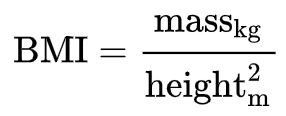Using %mprun: Hero BMI
You'd like to calculate the body mass index (BMI) for a selected sample of heroes. BMI can be calculated using the below formula:

A random sample of 25,000 superheroes has been loaded into your session as an array called sample_indices. This sample is a list of indices that corresponds to each superhero's index selected from the heroes list.
A function named calc_bmi_lists has also been created and saved to a file titled bmi_lists.py. For convenience, it is displayed below:
def calc_bmi_lists(sample_indices, hts, wts):
# Gather sample heights and weights as lists
s_hts = [hts[i] for i in sample_indices]
s_wts = [wts[i] for i in sample_indices]
# Convert heights from cm to m and square with list comprehension
s_hts_m_sqr = [(ht / 100) ** 2 for ht in s_hts]
# Calculate BMIs as a list with list comprehension
bmis = [s_wts[i] / s_hts_m_sqr[i] for i in range(len(sample_indices))]
return bmis
Notice that this function performs all necessary calculations using list comprehension (hence the name calc_bmi_lists()). Dig deeper into this function and analyze the memory footprint for performing your calculations using lists:
- Load the
memory_profilerpackage into your IPython session. - Import
calc_bmi_listsfrombmi_lists. - Once you've completed the above steps, use
%mprunto profile thecalc_bmi_lists()function acting on your superheroes data. Thehtsarray andwtsarray have already been loaded into your session.
After you've finished coding, answer the following question:
How much memory do the list comprehension lines of code consume in the calc_bmi_lists() function? (i.e., what is the total sum of the Increment column for these four lines of code?)
This exercise is part of the course
Writing Efficient Python Code
Hands-on interactive exercise
Turn theory into action with one of our interactive exercises
 Start Exercise
Start Exercise